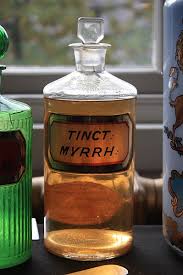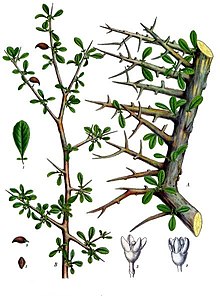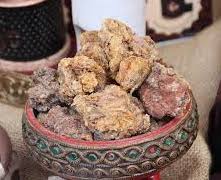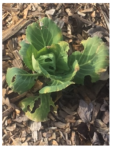 Introduction
Introduction
Probably of all the spices used in ancient history, myrrh is the chiefest of all. Most know it as one of the costly gifts given by the “wise men” to Jesus upon his birth. Myrrh means “bitter,” and gets its name from its taste. There is a rich depth of meaning to myrrh, from a spiritual standpoint. Because it was commonly used for embalming the dead in ancient societies, it was intimately connected to people’s emotions with the bitterness of death and suffering. But because it becomes sweet and fragrant when heated by a flame, or by the warmth of the skin, myrrh has a paradoxical meaning of resurrected life, and the sweetness of passion. Therefore, myrrh is a metaphor of this double-sided truth: that life comes through death, and there is a cost to intimacy with God.
About This Page
Because the Song of Songs mentions myrrh so many times, I wanted to learn more about it. This page is an attempt at drawing together some of this knowledge onto one page that could be accessed in the future, and adjusted as new information comes in. In other words, it is a “work in progress.” If any reader has anything to add or share about myrrh – your comment below is welcome!
NOTE: I first got excited about myrrh from a book titled: “All Your Garments: The Fragrance of Christ,” by a master herbalist & nutritionist, Darlene Rose. It is a sweet little book (and an easy read) that I highly recommend, and is only 99 cents for the Kindle version on Amazon. You can get it here. She also has a couple of blogs that I’m enjoying connecting with recently. This one is health related, and this one is more spiritual/Christ-centered.
Her study is based on Psalm 45:8, talking about Solomon’s robes (which in context, is a preparation for his wedding) “All Your garments are fragrant with myrrh and aloes and cassia; out of ivory palaces stringed instruments have made You glad.” Psalm 45:8
♚ Plant Origin/Method of Production
 Myrrh is steam distilled from gum/resin of a thorny tree or shrub that is found in the Middle East area and Arabia, Northeastern Africa (Ethiopia) and also parts of India.
Myrrh is steam distilled from gum/resin of a thorny tree or shrub that is found in the Middle East area and Arabia, Northeastern Africa (Ethiopia) and also parts of India. - The resin exudes out of the tree when there is an incision cut made into the tree bark. When people harvest myrrh, they wound the trees repeatedly to bleed them of the gum.
- Myrrh gum is waxy and coagulates quickly. After the harvest, the gum becomes hard and glossy. The gum is yellowish and may be either clear or opaque. It darkens deeply as it ages, and white streaks emerge.
- It is believed by some that the crown of thorns put on Jesus’ head at His crucifixion, may have come from the Myrrh tree.
♚ Uses / Characteristics
- Embalming the dead. This was probably its chiefest use, since it had the property of preserving dead bodies from putrefaction/fast decay. It was commonly used in Egypt as part of the mummification process, along with other essential oils. Scientists now know this is because the oils kill bacteria and other microbes.
- Relief from suffering. Although very bitter in taste, it was useful as a pain killer and was sometimes offered to those being crucified on the cross to numb their pain. The Roman soldiers brought myrrh to Jesus while He hung on the cross, mixed with gall. (Mark 15:23) The myrrh would numb the pain, and the gall would hasten death.
- Anointing Oils / Perfume: Myrrh has one of the highest levels of “sesquiterpenes,” which is a class of compounds that has direct effects on the hypothalamus, pituitary and amygdala, the seat of our emotions. When applied to the skin, and warmed by the pulses of the heart, Myrrh has a beautiful earthy scent.
- Incense / Cleansing ceremonies. Additionally, myrrh incense — often in combination with frankincense — was burned in places of worship to help purify the air and prevent the spread of contagious diseases, including those caused by bacteria. One recent study found that burning myrrh and frankincense incense reduced airborne bacterial counts by 68%. Oil of myrrh is used in Esther 2:12 in a purification ritual for the new queen to King Ahasuerus.
- Healing. Myrrh has antiseptic qualities. It is also thought by some to be in what is called the “healing balm of Gilead.” Myrrh has long been used in traditional Chinese medicine and Ayurvedic medicine. Scientists are now testing the oil’s potential uses, including for pain, infections, and skin sores.
- Valuable. It was brought by the wise men as a gift to Jesus, along with frankincense and gold. Some people processed and sold Myrrh for a living. Ex.: Gen. 37:25
♚ History

myrrh in its raw form
♚ Word Meaning
Latin name: Commiphora myrrha or also known as C. molmol
Hebrew: Mor (Strongs #4753)
- Original Word: מֹר
- Part of Speech: Noun Masculine
- Phonetic Spelling: (mor)
- Definition: myrrh “more,” from the root word “Mara” (#4843) meaning “To be bitter.” Or mowr {more}; from marar; myrrh (as distilling in drops, and also as bitter)
- Forms & transliterations: הַמֹּ֔ר הַמֹּ֤ר ׀ הַמּ֔וֹר המור המר מ֗וֹר מ֣וֹר מ֥וֹר מָר־ מֹ֚ר מֹ֥ר מֹר־ מוֹר֙ מוֹרִי֙ מור מורי מר מר־ ham·mō·wr ham·mōr hamMorhammōr hammōwr mār- mō·w·rî mō·wr mor mōr mōr- moRi mōwr mōwrî
- From: https://biblehub.com/str/hebrew/4753.htm
Greek: Smurna (Strongs # 4666)
- Original Word: σμύρνα, ης, ἡ
- Part of Speech: Noun, Feminine
- Phonetic Spelling: (smoor’-nah)
- Definition: myrrh (used as an ointment and for embalming)
- Forms & transliterations: σμύρνα σμυρναν σμύρναν σμυρνης σμύρνης smurnan smurnes smurnēs smyrnan smýrnan smyrnes smyrnēs smýrnes smýrnēs
- From: https://biblehub.com/str/greek/4666.htm
♚ Biblical References12 total in the Old Testament, 7 of which are in the Song of Songs Song of Songs References:
Other O.T. Biblical References
N.T. Biblical References Strongs #4666 : Smurna: See definition above (2 uses total)
Strongs #4669: Smurnizó: To be like myrrh, to mingle with myrrh (1 use total)
Strongs #3464: Muron: Anointing-oil, perfumed ointment, ie. costly ointment made with olive oil scented with myrrh. (14 uses total)
Strongs #4667: Symrna, the city (2 uses total)
|
♚ Intimate Kingdom Posts on Myrrh and/or Perfumes & Anointing:
|
♚ Other Resources:
♚ Other Miscellaneous Notes:
- In the Ancient Greek language, the related word μῠ́ρον (múron) became a general term for perfume.
- Modern myrrh has long been commented on as coming from a different source to that held in high regard by the ancients, having been superior in some way. Pedanius Dioscorides described the myrrh of the first century AD as most likely to refer to a “species of mimosa”, describing it “like the Egyptian thorn”. He describes its appearance and leaf structure as “spinnate-winged”.[17] The ancient type of myrrh conjectured was noted for possessing a far more delightful odor than the modern.
- Gregory of Nyssa commented: The Lord Himself, having become a balsam of myrrh (in His death) and taken residence in my heart itself, occupies the center of my awareness.
“Poured forth the fragrance fills a room and permeates a wall
The smell of heavens sweet perfume sends out a cry; a call” – Darlene Rose



Recent Comments